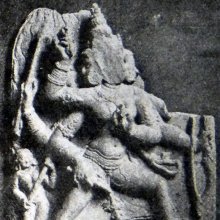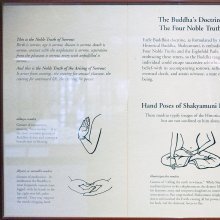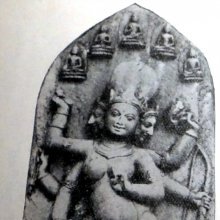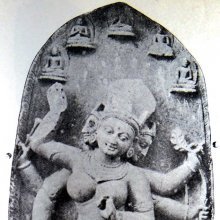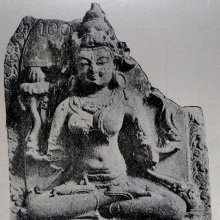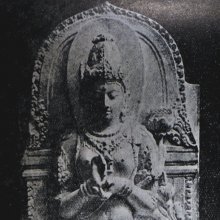Pleasant: 1 definition
Introduction:
Pleasant means something in Hinduism, Sanskrit. If you want to know the exact meaning, history, etymology or English translation of this term then check out the descriptions on this page. Add your comment or reference to a book if you want to contribute to this summary article.
Images (photo gallery)
In Hinduism
Natyashastra (theatrics and dramaturgy)
Source: Shodhganga: Elements of Art and Architecture in the Trtiyakhanda of the Visnudharmottarapurana (natya)The Pleasant (expression) is associated with Natā: one of the “six movements of the nose” (in Sanskrit Dramas), as conveyed through Āṅgikābhinaya: one of the four divisions of Abhinaya or “ways to convey or represent one’s emotion to others”, according to the Nāṭyaśāstra and the Viṣṇudharmottarapurāṇa, an ancient Sanskrit text which (being encyclopedic in nature) deals with a variety of cultural topics such as arts, architecture, music, grammar and astronomy.—The āṅgikābhinaya includes the histrionic representation of the limbs which is simply known as physical gestures. In the Viṣṇudharmottarapurāṇa as well as in the Nāṭyaśāstra, the varieties of nose movements have been mentioned in feminine gender. The natā movement (i.e., “bent nostrils”) denote pleasant state.

Natyashastra (नाट्यशास्त्र, nāṭyaśāstra) refers to both the ancient Indian tradition (shastra) of performing arts, (natya—theatrics, drama, dance, music), as well as the name of a Sanskrit work dealing with these subjects. It also teaches the rules for composing Dramatic plays (nataka), construction and performance of Theater, and Poetic works (kavya).
See also (Relevant definitions)
Starts with: Pleasant evening, Pleasant wood, Pleasantness.
Ends with: Unpleasant.
Full-text (+991): Suvasa, Hridya, Sughosha, Sukhasamvasa, Shubha, Prasvadas, Sukhaloka, Rucira, Caru, Priyadarsha, Anumata, Sukhashrava, Ramyantara, Madhura, Mandrajihva, Kaṇṇasukha, Sushravya, Sumadhura, Yathabhirucita, Priyamvada.
Relevant text
Search found 347 books and stories containing Pleasant; (plurals include: Pleasants). You can also click to the full overview containing English textual excerpts. Below are direct links for the most relevant articles:
Katha Upanishad with Shankara’s Commentary (by S. Sitarama Sastri)
Verse 1.2.1 < [Adyaya I, Valli II - The pursuit of Knowledge and Yoga]
Verse 1.2.2 < [Adyaya I, Valli II - The pursuit of Knowledge and Yoga]
Verse 1.1.8 < [Adyaya I, Valli I - The story of Vajasravasa]
Vipassana Meditation (by Chanmyay Sayadaw)
Chapter 4 - The Four Foundations Of Mindfulness
Part 1 - Chain Of Cause And Effect < [Chapter 4 - The Four Foundations Of Mindfulness]
Part 4 - Mindfulness Of Dhamma < [Chapter 4 - The Four Foundations Of Mindfulness]
Dhyana in the Buddhist Literature (by Truong Thi Thuy La)
2.3: Mindfulness (b): The Contemplation on Feelings < [Chapter 2 - The Dhyāna as depicted in Hinayāna Literature]
2.2: (1b) The Five Hindrances (Nīvarana) < [Chapter 2 - The Dhyāna as depicted in Hinayāna Literature]
4.2 (b): The Good Friend and the Subject of Meditation < [Chapter 4 - The Practice of Dhyāna]
Abhidhamma in Daily Life (by Nina Van Gorkom)
Abhidhamma in Daily Life (by Ashin Janakabhivamsa) (by Ashin Janakabhivamsa)
Part 3 - The Five Arammanas < [Chapter 10 - Rupa (matter)]
Condition 2 - Upadhi Sampatti And Upadhi Vipatti < [Part 4 - Condition for sufficiency and condition for deficiency (prosperity (sampatti) and misfortune (vipatti))]
Factor 2 - Vedana (feeling, sensation) < [Chapter 4 - Cetasikas Associated With Both Good And Bad Cittas (mind)]
Cetasikas (by Nina van Gorkom)
Chapter 2 - Feeling < [Part I - The Universals]
Chapter 11 - Enthusiasm < [Part II - The Particulars (pakinnaka)]
Chapter 33 - Compassion And Sympathetic Joy < [Part IV - Beautiful Cetasikas]
Related products
(+4 more products available)
